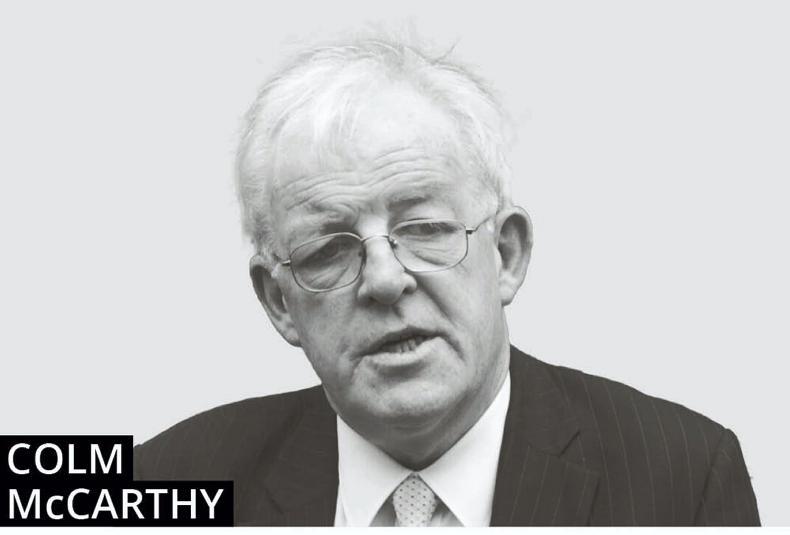Great events too readily become encased in the intellectual concrete called history, explained in a linear narrative of cause and effect, of conscious decision and the deliberations of great leaders. Too little heed gets paid to chance and happenstance and history gets written prematurely.
Because something happened and stands as documented fact, it is invested with an inevitability which was never visible to the participants, or even to the spectators, at the time. But maybe things just happen and something different could just as easily have happened. Chance, the great croupier and not the great leader, gets to determine events.
Hilary Clinton out-polled Donald Trump by almost three million votes in the 2016 presidential election, but Trump won under the electoral college system chanced upon two centuries earlier in a very different America. World War I, the centenary of which has been marked by some notably revisionist history-writing, was not inevitable at all: the Serbian nationalist Gavrilo Princip, who shot the Austrian Archduke Ferdinand in Sarajevo in 1914, could have missed and the leaders of Germany, Russia and Britain could have chosen (some almost did) to ignore the assassination. Instead they unleashed a conflict which, to their surprise and dismay, rewrote world history and cost 15m lives.
Conferring on elapsed fact the added status of historic inevitability is a powerful temptation. It happened, so it must have been pre-ordained, like Trump and World War One. This trap for the chronicler is beginning to infect the instant histories of Brexit, attributing the narrow referendum verdict to deep dysfunctions in Britain’s relationship to Europe which were somehow bound to play out as they have done. But these were not sufficiently manifest before the saga unfolded as to enable commentators to see what was coming.
English nationalism
Some of the instant histories are just terrific: I reviewed and recommended Fintan O’Toole’s Heroic Failure in these pages before Christmas. Fintan identifies accurately the rise of English, as distinct from British, nationalism as a critical ingredient in the unresolved Brexit drama. But Brexit almost never happened.
When David Cameron announced the in-or-out referendum in January 2013, he led a coalition government with the Liberal Democrats, a strongly pro-Europe party which would never have consented to a referendum on the issue. His promise was to run a referendum if the Tories won a majority on their own at the scheduled 2015 general election. At the time of Cameron’s conditional promise, the far-right UKIP party was nibbling away at Tory voting support in many English constituencies and the opposition Labour party was in reasonable shape. Cameron’s outright victory in 2015 was a surprise, not least to Cameron and he had to deliver. A collateral consequence of the Tory win was the selection of Jeremy Corbyn, a life-long Eurosceptic, to lead Labour, another surprise.
The Leave vote at the referendum was not 100%, it was 51.9%, a photo-finish as these things go. Day-long rainfall in the northeast and down the dreary North Sea coast to Essex and Kent could have swung the result the other way. Cameron ignored the advice of cabinet colleagues to ditch the referendum promise in the expectation that the Remain side would win, which they almost did. When Cameron resigned, the short straw fell to Theresa May as the Tory party formed up in a circular firing squad. She chose to interpret the result as mandating an end to freedom of movement and hence a hard Brexit. Another leader could have identified a less damaging course.
The current mess can reasonably be attributed to British exceptionalism, English nationalism, imperial nostalgia, an insular and xenophobic media, an uninspiring generation of front-bench politicians in both main parties and various other non-competing explanations.
It is unlikely that an in-or-out referendum would have yielded a Leave result in Spain or France, Italy or Germany. Of the large European countries, the UK was always the one most likely to quit through a popular vote and many of the reasons have been identified accurately by Fintan O’Toole among others.
But Brexit was also the outcome of a series of accidents, need not have happened and could certainly have been executed in less chaotic fashion than Mrs May and her changing cast of ministers have delivered.
Since circumstances can impel political outcomes which no rational person would promote, a premium is placed on caution and the avoidance of inviting chance to determine events. Don’t hold consultative referendums with a 50-50 prospect of winning would be one obvious lesson, especially for a party calling itself conservative.
History books
The history books will not be kind to David Cameron, but he will have a defence: I didn’t mean it to work out like this, it was just a succession of accidents. But he invited the Brexit bottle to spin.
Read more
Brexit protesters erect wall on Louth-Armagh border
Strathroy may build Brexit dairy in the Republic
Great events too readily become encased in the intellectual concrete called history, explained in a linear narrative of cause and effect, of conscious decision and the deliberations of great leaders. Too little heed gets paid to chance and happenstance and history gets written prematurely.
Because something happened and stands as documented fact, it is invested with an inevitability which was never visible to the participants, or even to the spectators, at the time. But maybe things just happen and something different could just as easily have happened. Chance, the great croupier and not the great leader, gets to determine events.
Hilary Clinton out-polled Donald Trump by almost three million votes in the 2016 presidential election, but Trump won under the electoral college system chanced upon two centuries earlier in a very different America. World War I, the centenary of which has been marked by some notably revisionist history-writing, was not inevitable at all: the Serbian nationalist Gavrilo Princip, who shot the Austrian Archduke Ferdinand in Sarajevo in 1914, could have missed and the leaders of Germany, Russia and Britain could have chosen (some almost did) to ignore the assassination. Instead they unleashed a conflict which, to their surprise and dismay, rewrote world history and cost 15m lives.
Conferring on elapsed fact the added status of historic inevitability is a powerful temptation. It happened, so it must have been pre-ordained, like Trump and World War One. This trap for the chronicler is beginning to infect the instant histories of Brexit, attributing the narrow referendum verdict to deep dysfunctions in Britain’s relationship to Europe which were somehow bound to play out as they have done. But these were not sufficiently manifest before the saga unfolded as to enable commentators to see what was coming.
English nationalism
Some of the instant histories are just terrific: I reviewed and recommended Fintan O’Toole’s Heroic Failure in these pages before Christmas. Fintan identifies accurately the rise of English, as distinct from British, nationalism as a critical ingredient in the unresolved Brexit drama. But Brexit almost never happened.
When David Cameron announced the in-or-out referendum in January 2013, he led a coalition government with the Liberal Democrats, a strongly pro-Europe party which would never have consented to a referendum on the issue. His promise was to run a referendum if the Tories won a majority on their own at the scheduled 2015 general election. At the time of Cameron’s conditional promise, the far-right UKIP party was nibbling away at Tory voting support in many English constituencies and the opposition Labour party was in reasonable shape. Cameron’s outright victory in 2015 was a surprise, not least to Cameron and he had to deliver. A collateral consequence of the Tory win was the selection of Jeremy Corbyn, a life-long Eurosceptic, to lead Labour, another surprise.
The Leave vote at the referendum was not 100%, it was 51.9%, a photo-finish as these things go. Day-long rainfall in the northeast and down the dreary North Sea coast to Essex and Kent could have swung the result the other way. Cameron ignored the advice of cabinet colleagues to ditch the referendum promise in the expectation that the Remain side would win, which they almost did. When Cameron resigned, the short straw fell to Theresa May as the Tory party formed up in a circular firing squad. She chose to interpret the result as mandating an end to freedom of movement and hence a hard Brexit. Another leader could have identified a less damaging course.
The current mess can reasonably be attributed to British exceptionalism, English nationalism, imperial nostalgia, an insular and xenophobic media, an uninspiring generation of front-bench politicians in both main parties and various other non-competing explanations.
It is unlikely that an in-or-out referendum would have yielded a Leave result in Spain or France, Italy or Germany. Of the large European countries, the UK was always the one most likely to quit through a popular vote and many of the reasons have been identified accurately by Fintan O’Toole among others.
But Brexit was also the outcome of a series of accidents, need not have happened and could certainly have been executed in less chaotic fashion than Mrs May and her changing cast of ministers have delivered.
Since circumstances can impel political outcomes which no rational person would promote, a premium is placed on caution and the avoidance of inviting chance to determine events. Don’t hold consultative referendums with a 50-50 prospect of winning would be one obvious lesson, especially for a party calling itself conservative.
History books
The history books will not be kind to David Cameron, but he will have a defence: I didn’t mean it to work out like this, it was just a succession of accidents. But he invited the Brexit bottle to spin.
Read more
Brexit protesters erect wall on Louth-Armagh border
Strathroy may build Brexit dairy in the Republic









SHARING OPTIONS